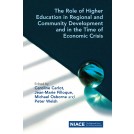The Role of Higher Education in Regional and Community Development and in the Time of Economic Crisis
The details of the latest book from PASCAL, The Role of Higher Education in Regional and Community Development and in the Time of Economic Crisis, edited by Caroline Carlot, University of Strasbourg, Jean-Marie Filloque, University of Brittany, and Mike Osborne and Peter Welsh, both University of Glasgow, are now available on the NIACE website at this link.
Set out in two main parts, this book illustrates concepts and practices covering the wide range of forms of engagement that universities can have with their regions. A number of the chapters deal with the challenging issues of our times, which have become the core concerns of politicians, funders of research, academics and civil society, including climate change, food security, youth unemployment, indigineity, health and demography, and frames them within the contexts of rurality and the economic crisis. The collection provides variously theoretical contexts for understanding the university’s role in engagement, tools for analysis, and many concrete examples of practice. All of these elements are important not only for universities, but also their regions and their multiple stakeholders.
The first part considers the role of higher education (HE) in regional and community development, with special consideration for remote or isolated regions, Examples of best practice from local initiatives, which are often the result of bringing together individuals from very diverse backgrounds and disciplines, are presented, and include the lifelong learning strategies of universities as they pertain to the development of a sustainable economy and issues of rurality. The second part considers the role of HE in a time of crisis. It builds on the recurrent and topical subject of crisis – economic, social and political – but also that related to climatic and environmental events. The chapters in this theme examine, from various angles, questions covering the roles and responsibilities of universities and the results of their research, independence and funding, elite and popular education, responsibility and awareness-raising.
This book will be of interest to:
- individuals in universities developing outreach activity with regional stakeholders across a range of discipline specialisms, including staff in continuing education and outreach settings;
- those in both the public and private sectors who are existing or potential beneficiaries of university outreach, who will be introduced to practices that both validate what they are currently doing and provide insight into what is possible; and
- scholars in continuing education, administrative studies and urban studies.
 Printer-friendly version
Printer-friendly version- David Shaw's blog
- Login to post comments
- 384 reads





